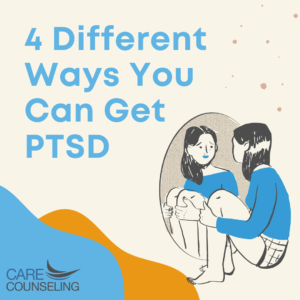 An essential feature of Posttraumatic Stress Disorder (PTSD) involves exposure to traumatic events in which there is threatened death, serious injury, or sexual violence. In response to these types of events, symptoms such as intrusive thoughts or images of the event, nightmares, flashbacks, severe anxiety, avoidance, intense distress to triggers of trauma, and changes in mood may be present. According to SAMHSA, 61% of men and 51% of US women report exposure to at least one-lifetime traumatic event and certain groups are at increased risk.
An essential feature of Posttraumatic Stress Disorder (PTSD) involves exposure to traumatic events in which there is threatened death, serious injury, or sexual violence. In response to these types of events, symptoms such as intrusive thoughts or images of the event, nightmares, flashbacks, severe anxiety, avoidance, intense distress to triggers of trauma, and changes in mood may be present. According to SAMHSA, 61% of men and 51% of US women report exposure to at least one-lifetime traumatic event and certain groups are at increased risk.
One question that individuals wonder about is “How can I get PTSD?”
Let’s look at four different ways you can get PTSD and examples of each:
Direct Experiencing of Trauma
Direct experiencing means that you have experienced a traumatic event such as physical or sexual abuse firsthand.
Examples:
- Being physically or sexually assaulted (including sexual coercion and unwanted sexual experiences)
- Experiencing physical or sexual abuse in childhood
- Being a victim of community violence (e.g., robbery, kidnapping, carjacking)
- Being bullied, harassed, or experiencing hate crimes (e.g. the LGBTQ and BIPOC community, religious communities, and those with disabilities are at increased risk.
- Experiencing military trauma (e.g. serious training accident, being taken hostage and tortured)
- Living through a natural disaster such as Hurricane Katrina
- Surviving a severe accident such as a motorcycle, car, or plane crash
- Life-threatening medical emergencies involving terror/ imminent death
Witnessing Trauma
Witnessing means that you have observed a traumatic event such as physical or sexual violence happen to someone else.
Examples:
- Witnessing someone being physically attacked, harassed, or severely bullied
- Witnessing a crime or community violence (e.g., murder, shooting)
- Children/ youth witnessing domestic violence in the home
- Children/ youth witnessing a sibling being sexually or physically abused
- Being deployed in a war zone and witnessing severe injury or death
- Being present during disasters, accidents, and emergencies and directly witnessing trauma
Learning About Trauma
Learning about trauma events (plus distressing details) that happened to close family/ friends is a key part of this category.
Examples:
- Learning that a friend/ family member was murdered, assaulted, or raped.
- Learning that a loved one was severed injured or died (e.g., via accidents, combat, suicide attempt, or death by suicide)
- Learning about family members surviving horrific events as part of historical/ multigenerational trauma (e.g. slavery, historical losses of Indigenous people, the Holocaust)
Repeated Experiencing Aversive Details
This category is often referred to as secondary traumatic stress due to the emotional impact of repeated trauma details.
Examples:
- Working in a profession in which there is indirect exposure to graphic violence/ aftermath of crime or war and professions in which there are risks for serious injury or death (e.g., police officers, military, investigative reporters)
- Working in professions in which there is repeated exposure to trauma narratives and details of physical and sexual abuse (e.g. child welfare workers, therapists)
CARE Counseling is here to support those who have experienced all forms of trauma. Trauma treatment may include exploring and processing the traumatic event, managing the impact of trauma-related symptoms, and finding ways to re-experience life with a sense of peace and safety. CARE Counseling has a variety of therapists and interventions to help meet you where you are at. If you can relate to one or more of the examples listed above and have been having a difficult time coping, it may be time to reach out and talk to a therapist.
Written By: Charlotte Johnson, MA, LPCC
We’re Here to help
Our wellness experts will be happy to take care of you. You can CLICK HERE to schedule an appointment now or call (612)223-8898.
Meet Clinicians
We’re united by our commitment to providing effective, relevant, and innovative mental health support at all stages of your journey. Click Here to find a therapist or find out more about who we are, where we come from, and how we live out CARE’s mission every day.
The professionals at CARE are actively collecting and creating resources to help with what you need and address frequently asked questions. We’re Here for You.



